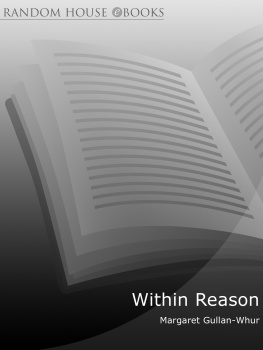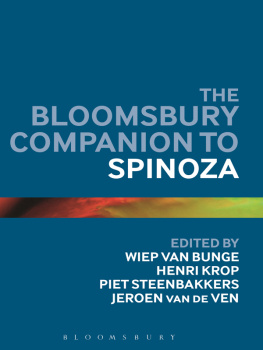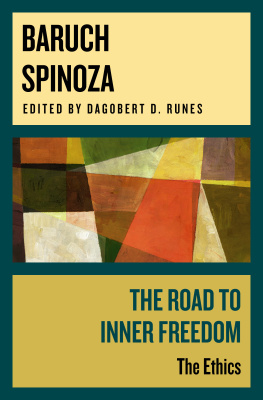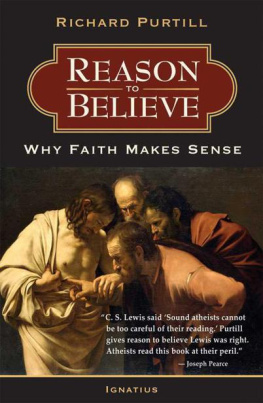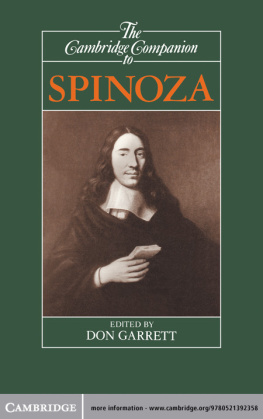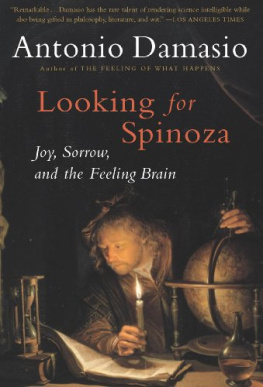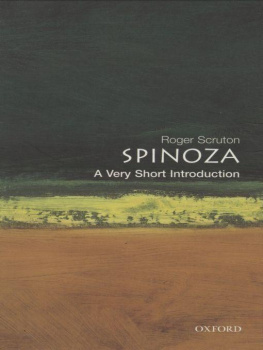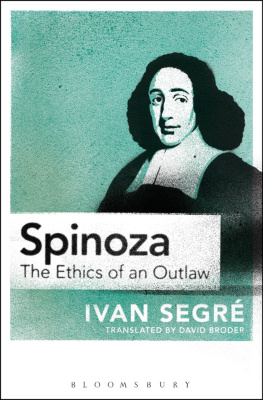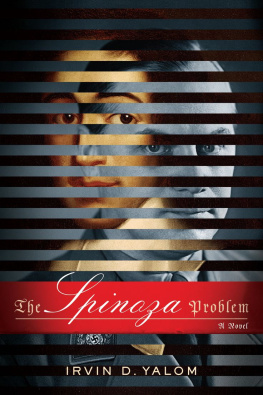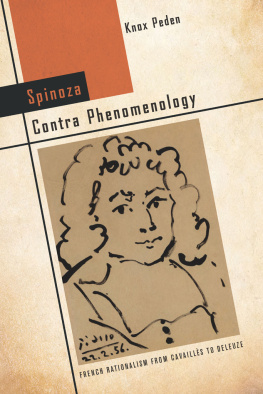PIMLICO
WITHIN REASON
Margaret Gullan-Whur gained a first-class degree in philosophy and critical theory of literature from the University of East Anglia, and a doctorate in the philosophy of Spinoza from University College London. She is the author of The Four Elements, a study of the basis of the theory of humours.
WITHIN REASON
A Life of Spinoza
MARGARET GULLAN-WHUR
This eBook is copyright material and must not be copied, reproduced, transferred, distributed, leased, licensed or publicly performed or used in any way except as specifically permitted in writing by the publishers, as allowed under the terms and conditions under which it was purchased or as strictly permitted by applicable copyright law. Any unauthorised distribution or use of this text may be a direct infringement of the authors and publishers rights and those responsible may be liable in law accordingly.
Version 1.0
Epub ISBN 9781446412350
www.randomhouse.co.uk
Published by Pimlico 2000
2 4 6 8 10 9 7 5 3 1
Copyright Margaret Gullan-Whur 1998
Margaret Gullan-Whur has asserted her right under the Copyright, Designs and Patents Act, 1988 to be identified as the author of this work
This book is sold subject to the condition that it shall not, by way of trade or otherwise, be lent, resold, hired out, or otherwise circulated without the publishers prior consent in any form of binding or cover other than that in which it is published and without a similar condition including this condition being imposed on the subsequent purchaser
First published in Great Britain by
Jonathan Cape 1998
Pimlico edition 2000
Pimlico
Random House, 20 Vauxhall Bridge Road,
London SW1V 2SA
Random House Australia (Pty) Limited
20 Alfred Street, Milsons Point, Sydney,
New South Wales 2061, Australia
Random House New Zealand Limited
18 Poland Road, Glenfield,
Auckland 10, New Zealand
Random House South Africa (Pty) Limited
Endulini, 5a Jubilee Road, Parktown 2193, South Africa
The Random House Group Limited Reg. No. 954009
www.randomhouse.co.uk
A CIP catalogue record for this book is available from the British Library
ISBN 0-7126-6652-4
For the Vereniging Het Spinozahuis
and Tom Sorell
CONTENTS
Birth in the war-torn northern Netherlands a Jewish destiny dissimulation and blessedness the trouble with women (i)
Earliest impressions the attractions and tensions of a fashionable city the bright boy and the family business death and the ziel
A synagogue education a political crisis war non-Jewish intellectual attractions an unwilling merchant cast out of synagogue, family and means of livelihood
Lost wealth lost honour a little girl mathematics and the search for a simple, universal religion optics the genesis of a philosophy
University rejected enthusiasm endured international respect writerly frustration
A society of the kind that is desirable the expert on Descartes plague and other deadly diseases
Close affection and hostile acquaintance a session with Calvins envoy war with England the trouble with women (ii)
Self-esteem and sleight of pen impious doctrines State-sanctioned murder
War with France a new source of support for Spinoza, unfortunately French new intellectual stimuli a family at last Orangist upsurge and the underside of The Hague
Stadholderate restored a submerging of peace and honour common affection and uncommon persecution
The testing of a metaphysic the testing of a temperament the wages of unreason the truth about Spinozas atheism Ethics gathers dust
A passion for freedom more problems for reason a second-best republic the trouble with women (iii) of human bondage what friends are for
LIST OF ILLUSTRATIONS AND TRANSLATION ACKNOWLEDGEMENTS
1. Map of Amsterdam (1647)
2. The Beth Haim at Ouderkerk, the Jewish burial place outside Amsterdam, engraving by Romeyn de Hooghe (by permission of Rijksmuseum, Amsterdam)
3. The Nes, Amsterdam (Historisch-topografische Atlas of the Gemeentearchief of Amsterdam, by permission)
4. Ren Descartes, portrait by David Beck (by permission of the Royal Swedish Academy of Sciences, Stockholm)
5. Henry Oldenburg, portrait by Jan van Cleff (by permission of the President and Council of the Royal Society, London)
6. Christiaan Huygens, plaquette by Jean-Jacques Clrion (by permission of the Academisch Historisch Museum, University of Leiden)
7. Coenraad van Beuningen, engraving by Cornelis Meyssens (by permission of the Rijksmuseum, Amsterdam)
8. Spinozas room at Rijnsburg (photograph by Jeremy Gullan-Whur)
9. Spinozas home, 724 Paviljoensgracht, The Hague (photograph by Theo van der Werf)
10. Johan de Witt, portrait by Adriaen Hanneman (by permission of the Museum Boijmans Van Beuningen, Rotterdam)
11. William III, portrait by Adriaen Hanneman of the prince aged 14 (1664), painted for the English Court (The Royal Collection, Her Majesty the Queen, by permission)
12. Atrocities of the French invasion, 1673, engraving by Romeyn de Hooghe (by permission of the British Library, Shelf Mark 591 d.21)
13. The Battle of the Texel, 1121 August 1673, painting by Willem van de Velde the Younger (National Maritime Museum London, by permission)
14. Letter to Joh. Georg Graevius, 14 December 1673 (Royal Library Copenhagen)
15. Spinozas seal, from a letter to Gottfried Wilhelm Leibniz, 9 November 1671 (Niederschsische Landesbibliothek, Hannover)
16. Spinoza, engraved frontispiece of the Opera Posthuma, 1677 (Vereniging Het Spinozahuis)
The author and publishers thank the following for permission to use translations:
Curley, Edwin, The Collected Works of Spinoza. Copyright 1985 by Princeton University Press. Selections reprinted by permission of Princeton University Press.
Spinoza: The Letters, translated by Samuel Shirley, with an introduction and notes by Steven Barbone, Lee Rice and Jacob Adler. Copyright 1995 by Hackett Publishing Company. All rights reserved. Selections reprinted by permission of Hackett Publishing Company.
The Philosophical Writings of Descartes, 2 vols., translated by J. Cottingham, R. Stoothoff and D. Murdoch, Cambridge University Press, 1985. The Philosophical Writings of Descartes, Volume III: The Correspondence, translated by J. Cottingham, R. Stoothof, D. Murdoch and A. Kenny, Cambridge University Press, 1991. Selections reprinted by permission of Cambridge University Press.
Spinoza: The Political Works. The Tractatus theologico politicus in part and the Tractatus politicus in full. Edited and translated with an introduction and notes by A.G. Wernham, Oxford University Press, 1958. Selections reprinted by permission of Oxford University Press.
ACKNOWLEDGEMENTS, TECHNICALITIES AND
A CONFESSION
Anyone embarking on a biography of Spinoza soon realises why so few have been attempted during the twentieth century. Facts lie buried in obscure documents written in half a dozen European languages, and some to echo the frustration of the editor of the Dutch edition of the Posthumous Works may still be in the possession of someone or other.
It would have been impossible to complete this life of Spinoza by myself. It did not prove enough to learn Dutch in order to get into the records and scholarly literature often ignored due to that languages inaccessibility. The framework from which old documents derive their meaning requires expert interpretation. My greatest debt is to Theo van der Werf, secretary of the
Next page
